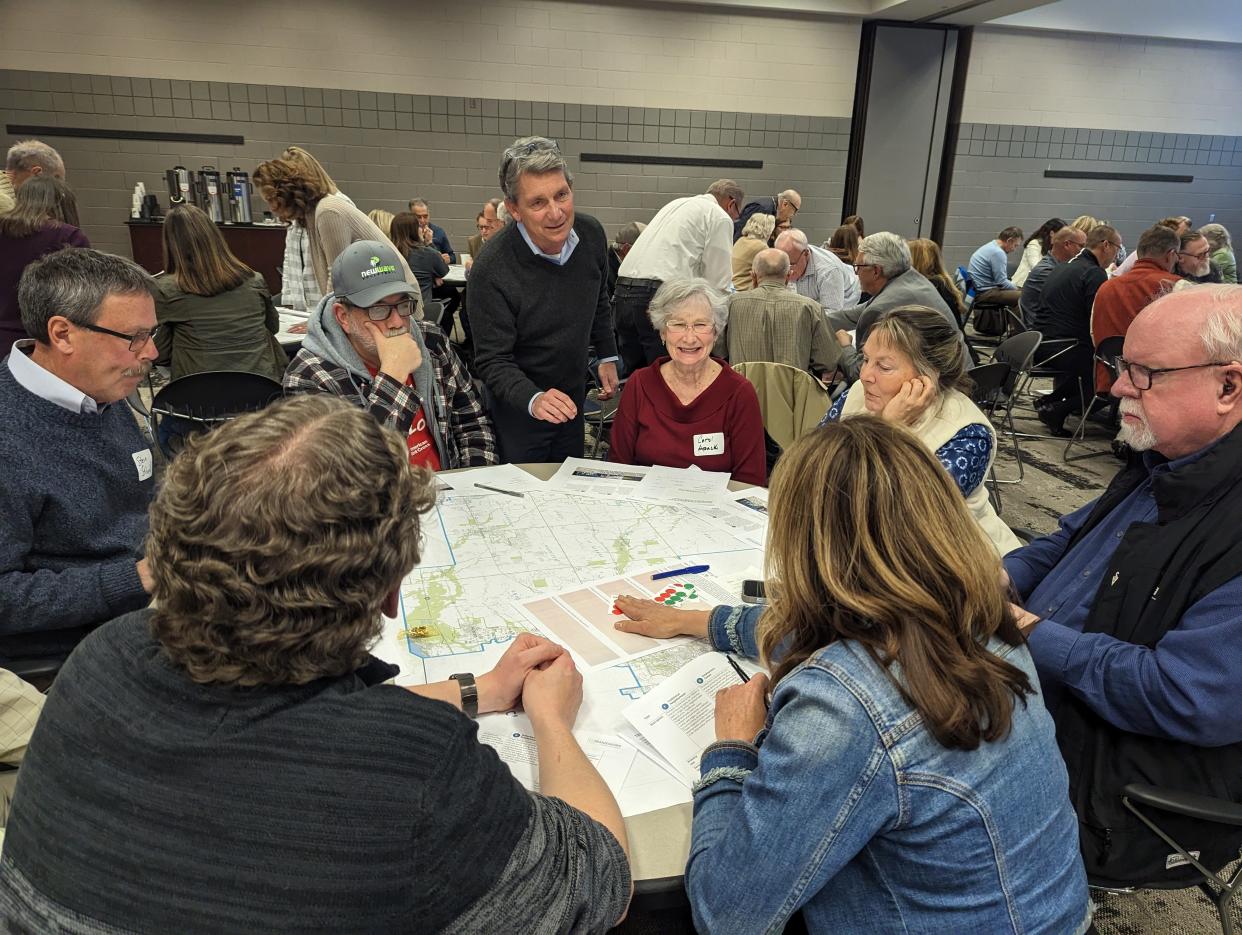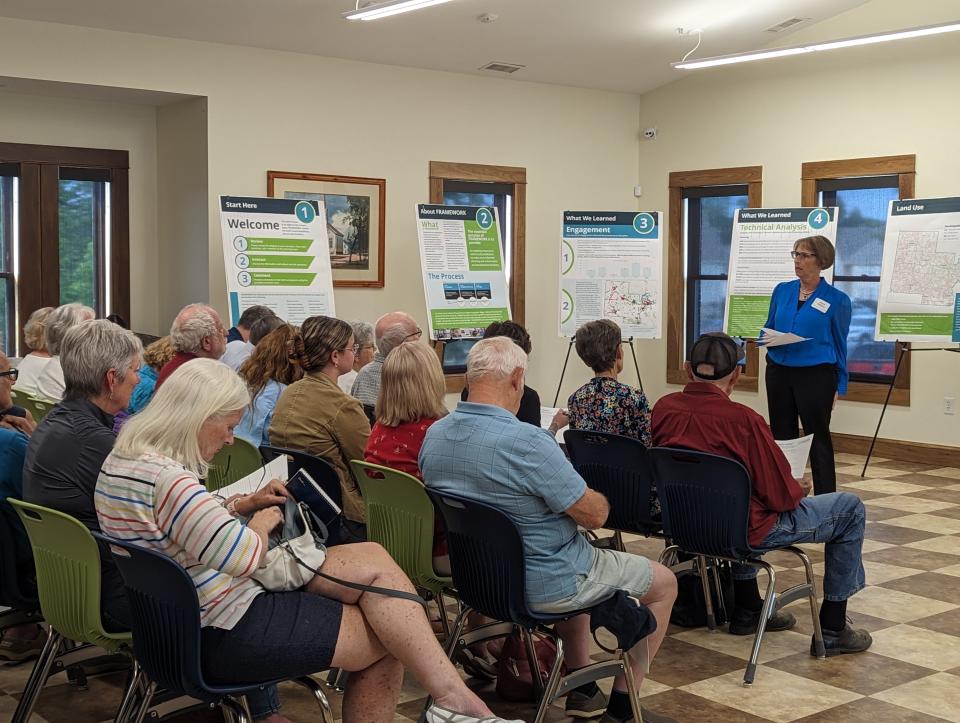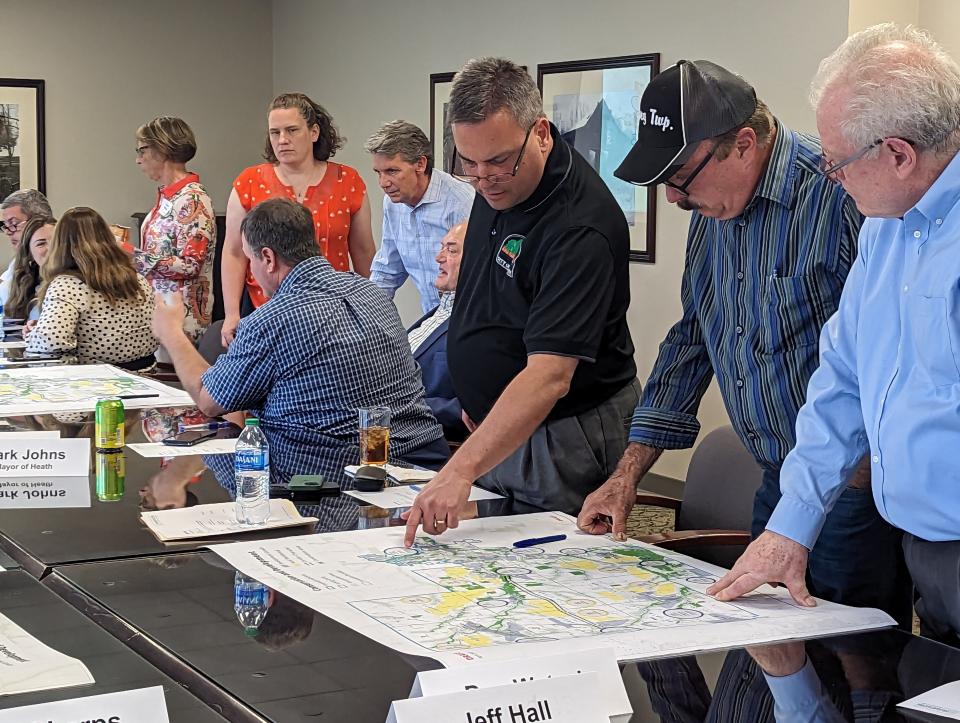Framework effort unveils final report to help Licking County communities plan for Intel

Framework, the unprecedented 15-jurisdiction, public-private effort in Licking County to help plan for Intel Corp.'s $20 billon development near Johnstown, released its final report Monday after more than a year of work.
Organized by the Thomas J. Evans Foundation, Framework brought together county, city, village and township officials, from Newark west to the county line, for monthly meetings with national planning firm Planning NEXT to plan for future development that will follow Intel to Licking County.
Evans Foundation Chairwoman Sarah Wallace said the report will empower local communities to shape their future growth by making more informed planning, conservation and development decisions.
"We have forged important relationships with one another that will serve our communities for years to come, new collaborations have emerged, and multi-jurisdictional problem solving and resolution have begun," Wallace said in a statement.
Through the planning effort, Wallace said the group gained a better understanding of the long-term risks of not having a full range of housing options in the county, the sectors that drove economic growth over the past decade in Licking County, and the potential magnitude of growth to come.

"While none of us have a crystal ball, we now know what could happen and how to plan to manage the growth to our advantage," she said in the statement. "We have been armed with technical data, constituent insight and tools that can help each of us make better, more informed decisions."
The report can be viewed on Framework's website, frameworklc.org.
The participating governments were: Licking County; Newark, Heath, Johnstown and Pataskala; the villages of Alexandria, Granville and Hebron; and the townships of Granville, Harrison, Jersey, Liberty, Monroe, St. Albans and Union.
The report really comes from the people of Licking County, Wallace said in an interview. Framework completed 150 stakeholder interviews and 52 outreach and engagement events, and more than 100 people attended a stakeholder meeting. More than 4,000 people participated in surveys and public engagement events.
"It really provides amazing clarity for the elected officials to know what people are thinking," she said.

The 180-page report includes detailed data about existing land uses, the state of housing in the county, zoning and land use maps and much more.
It also includes four case studies on cities that previously experienced rapid growth, including Hillsboro, Oregon and Chandler, Arizona — two cities where Intel already has facilities.
The report ends with more than 70 best practices and actions local governments can take to best manage the incoming growth in a way that makes sense for their individual communities.
Wallace said the report's recommended actions aren't mandatory, though she expects each community will review them and determine the top three or four priorities. Those actions could include tweaking a comprehensive plan, updating zoning, preparing design guidelines and more.
"It's their tool to help them make better decisions and feel confident in what they're doing and make sure that the decisions they're making are going to shape their communities the way communities want to be shaped," she said.
One of the main goals of Framework was to get community leaders thinking differently, Wallace said, and that is starting to happen.
Pataskala Mayor Mike Compton said the city is already thinking differently about roadways and housing. He said the city will focus on Broad Street, Hazelton-Etna Road and Mink Street to determine if improvements are needed to handle more traffic.
When it comes to housing, Compton said the city can't dismiss apartments or condominiums. According to data gathered during the Framework process, 82% of housing units in Licking County are single-family homes or duplexes.
Wallace said the county lacks apartments as well as housing options for older residents who are ready to downsize and free up a single-family home for young families.
Compton said Pataskala is trying to remain a rural community, but it also needs to thoroughly examine proposals for apartments and condos. That means asking developers for specific photo examples of what they want to build or requesting they design a community that has rural architecture so it fits within the community.
"We just have to make sure we have it all for what the folks want," he said.
Granville Township Trustee Bryn Bird said that allowing for some density housing — which for Granville Township would be anything more than one home per 5 acres — could be a way to protect the rural landscape the community loves. Allowing for density in certain areas, she said, allows for other areas to be set aside for agriculture, open space or future park locations.
"If you don't do anything and everything gets gobbled up in these 5-acre lots, you lose all the rural landscape. You've used up every piece of land that you had," she said.
As the township and village of Granville finalize their comprehensive plan and plan zoning overlay districts, Bird said, they will rely on the Framework report's best practices so any growth can be an extension of the existing Granville community. She said Granville's walkability makes the area unique because churches, restaurants and shops are all next to each other.
"That mixed use is what makes Granville special, and we want to grow out with that maintained connection to our community. And if we don't, then we will just create subdivisions," she said.
Framework's action items aren't specific to the communities that participated. Wallace said the final report provides tremendous value for any Licking County community and that any village or township can still use the final report as a planning guide for their community.
"Any township can pick that up and they can use that (implementation) matrix. It was designed that way from the very start," she said.
Elected officials outside the Framework footprint were briefed on the progress over the winter, Wallace said, and another meeting will be held with them Sept. 21 to go over the final report.
But Framework's work is not over. Wallace said the leadership group will meet quarterly over the next year to provide more education, guidance on implementation items, general support and to continue the lines of communication.
Wallace said collaboration among leaders will be important as the county addresses issues that cross jurisdiction lines, such as transportation. Now that the report is done, the heavy lifting of implementing it starts now, she said.
"This is where the collaboration and the communication is so critical," Wallace said.
mdevito@gannett.com
740-607-2175
Twitter: @MariaDeVito13
This article originally appeared on Newark Advocate: Framework effort unveils report to help communities plan for Intel

